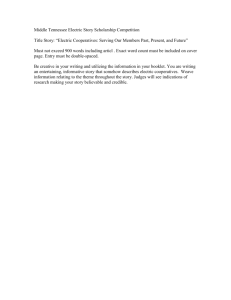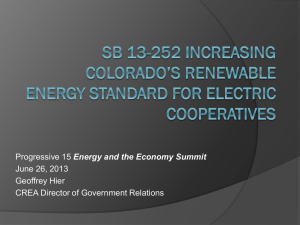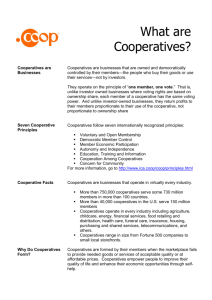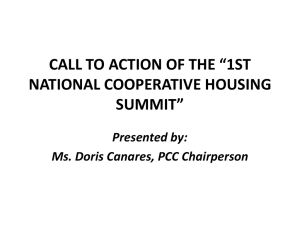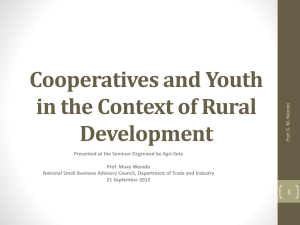cooperative_zsuzsa_meszaros
advertisement
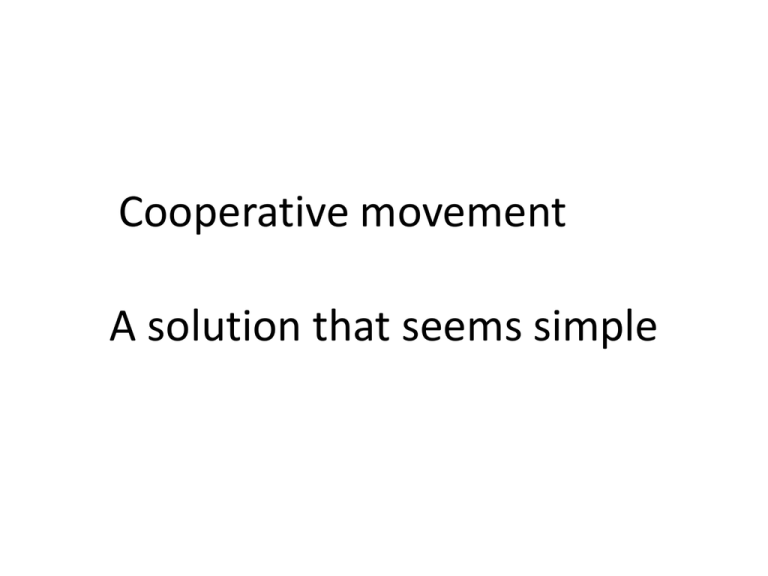
Cooperative movement A solution that seems simple My motivation -It feels good to live in a community -Members of the community complete each other’s abilities -It gives me the pleasure of creating economic and social values -It’s functioning is based upon principals that are worth living for: equality, community, solidarity, justice, independence, freedom A foreign body? A contested organizational form • –In capitalist countries – too collective –In socialist countries or communities with similar principles – too individualist in between capitalist entreprises and social organizations present in the for-profit sector and in social economy, too Looking for the „third way” „towards an ideal society Capitalism -excessively focused on profit. What are the pros and cons? What is reality? - instead of socialism unable to produce profit? (Széchenyi) Cooperative A force organizing society: self aid, self control, solidarity, independence Solidarity in economy as well. „Groups of people organize themselves and start cooperatives upon based upon their own investment to satisfy their needs. This is the best form of self aid.” (John F. Kennedy) The beginning People have the right to participate in cooperatives and the state has to let them evolve spontaneously without trying to control them. -after works of St Thomas Aquinas Intervention or spontaneous development Politics have already played withlegal frameworks and values of cooperatives in order to obtain social change A cooperative -has historical roots (experiences, people participating, economical results) -implies some philosophical views, an attitude -is based upon self-organization and selfimprovement it has an influence on people’s intellect, will and behaviour -resolves the conflict of property and work The motivation conscious reaction of people to an economical crisis in order to overcome it OR the state reacts to the crisis helping the foundation of cooperatives people create cooperatives to get financial support from the state => momentary safety BUT real help is to enable people to organize themselves What could the intention be behind the intervention of the state? If the financial investment comes from the state and not the members? • If the state is a member of the cooperative (through local governments) (questions of property-dependence)? • If the favoritism of the state enters the game, who benefits who doesn't? • If the legal frameworks are modified in order to strengthen the position of circles who share interest with those in power? • If the legal frameworks are not stable enough? • Could a self-organizing, self-controlled cooperative movement grow in these conditions? • Principles: Congress of Manchester (1995) 7 fundamental principles -Voluntary and open membership -Democratic member control -Member economic participation -Autonomy and independence -Education, training, and information -Cooperation among cooperatives -Concern for community 6 fundamental values self aid equality individual responsibility democracy justice solidarity The criterias of the functioning of cooperative loosen up Principles that are essential to a cooperative -Voluntary and open membership -Democratic member control „one member, one vote” -Functioning based upon social and econimical activites at the same time How cooperatives and capitalist enteprises influence each other in the global economy Cooperatives Capitalists -Controlled share of profit - Methods of keeping consumers and extending their cirle -Tools of keeping consumers engaged -Developing emotional attachment Concentration of financial ressources •Specialization •Quick decision making •Image development •Flexibility • In Hungary at the moment... 5300 cooperatives, 800.000 members • starting capital 230 billion HUF • profit 800 billion HUF • Social cooperatives in Hungary today 2011 259 registered cooperatives 2014 1934 registered cooperatives Support of social cooperatives OFA (2007) out of 49 supported cooperatives 7 functions in 2011 OFA (2008) out of 21 supported cooperatives (5 formerly supported) 7 functions in 2011 1 cooperative supported both years ceased functionning -----------EU support (TÁMOP) 141 (salaries, courses, investment 25 %, obligation of spending all incomes during the project period ) Changing of the legal framework • 1992. (lands back to former owners) • 2006. X. tv introduction of the notion of social cooperatives • 2011. CVI. Tv. Public employment and cooperatives 2012. évi XXXVII. Tv. Registration fee cancelled for social cooperatives • • 2013. évi XLI. Tv. (membership of local governments) • 2014. financial contribution (new Ptk) Questions: Intervention of the state: using cooperatives for political purposes... OR/AND? • Would it be more fruitful to help cooperatives develop spontaneously (a slower process)? • What happens if laws (and political will) intervene to a tradition ? • • Norms, values, principles? Thank you for your attention! Zsuzsa Mészáros mezsu.kunbabony@gmail.com
